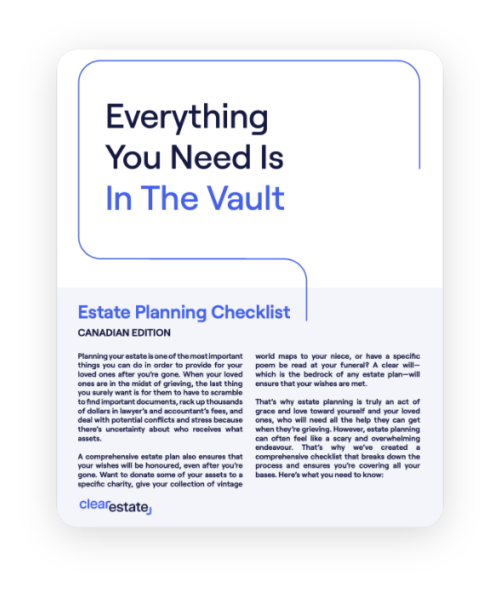Estate Planning
Feb 13, 2026
Executor of a Will: What the Role Involves and When to Seek Professional Help
Preparing an estate plan and feeling unsure about who to name as executor, or even what the role entails? We explain below.
Estate planning in BC made simple. Get expert insights on local laws, tools, and strategies to safeguard your assets and family's future


As the aging population in Canada swells, with predictions that by 2024, 20% will be aged 65 or older, the significance of estate planning becomes increasingly evident.
Yet, a 2023 IG Wealth Management study found that a mere 25% of Canadians have taken this essential step. In British Columbia (BC), where estate planning encompasses not just wills and trusts but also legal provisions like Power of Attorney, this process is crucial.
Beyond dictating asset distribution post-death or incapacitation, strategic estate planning in BC also plays a pivotal role in protecting family inheritances, streamlining legal procedures, and optimizing tax implications.
Estate planning is not merely a task for the wealthy or elderly; it's a crucial step for individuals and families at various stages of life. Here's why planning for the future is essential:
Control and Assurance: Without proper estate planning, you relinquish control over the distribution of your assets. An estate plan allows you to make informed decisions and tailor a strategy that reflects your values and desires.
Family Security: Estate planning offers peace of mind by avoiding potential disputes among family members. Clearly outlining your wishes can reduce misunderstandings and legal battles, preserving familial harmony.
Minimizing Legal Complications: A well-thought-out estate plan can minimize tax liabilities and legal hurdles, making the transition smoother for your loved ones.
Consequences of No Plan: On the contrary, a lack of estate planning can lead to complex and stressful legal procedures. Assets may be distributed in a way that you wouldn't have intended, and family members might end up embroiled in costly legal battles. Additionally, unnecessary taxes and fees can diminish the value of the estate, causing financial strain on those left behind.
Estate planning ensures that your assets are distributed with foresight and compassion, in accordance with your intentions, rather than being left to the uncertainty of BC's intestate laws.
A mounted fish, caught by the Redditor's grandfather, became the focal point of a family feud between the Redditor's father and cousin after both laid claim to it. The disagreement escalated over the years, reaching a point where the father threatened to miss his own son's wedding if the cousin attended.
The conflict symbolizes the deep-seated resentment and division within the family over an object that has grown to represent more than just a mere fish. The Redditor reflects on the drama caused by the fish, expressing a wish to have destroyed it to prevent the rift within the family.
The initiation of estate planning begins with a clear understanding of what you aim to achieve. Whether your priority is wealth preservation, philanthropy, or ensuring a smooth transition of assets, identifying your unique goals is paramount.
Defining Estate Planning Aims: Estate planning is about more than just writing a will. It's a strategic process designed to maximize the benefits to beneficiaries, minimize taxes, and ensure your wishes are carried out. It includes contingencies for incapacity and even considers your desires for medical treatment.
Emphasizing Personalization: Every individual’s situation is distinct. The family dynamics, financial structure, and personal values that define you must be intricately woven into your estate plan. Customization ensures that your plan accurately reflects your specific needs and ambitions.
Choosing the right estate planning tool is a vital step that hinges on your specific goals and circumstances. Here's a breakdown of the primary tools and their alignment with different objectives:
Wills: A will is a foundational document that outlines your wishes regarding the distribution of assets. It's generally suitable for straightforward estates and can be customized to a certain degree.
Trusts: Trusts offer more flexibility and control over how assets are managed and distributed. They are particularly useful for complex situations, offering advantages like tax savings, protection from creditors, and provisions for special needs beneficiaries.
Power of Attorney: This legal document allows you to designate someone to act on your behalf in financial or health-related matters, particularly if you become incapacitated.
Advanced Healthcare Directives: These documents state your preferences for medical treatment and allow you to designate someone to make medical decisions for you if you are unable to do so.
Guidance on Selection:
The choice of tool(s) will depend on factors such as the complexity of your estate, your familial considerations, tax implications, and more.
Consulting with an estate planning professional can provide personalized advice, ensuring that your chosen approach aligns seamlessly with your individual objectives.
Estate planning necessitates a meticulous gathering of financial documents and data.
Here's what you need:
Essential Documents: Include wills, trusts, power of attorney, property deeds, bank statements, investment portfolios, insurance policies, and any business agreements.
Organizing and Storing: Organize these documents in a secure yet accessible location. Consider using a safe deposit box, digital vault, or trusted legal representative. Regularly update this information, and inform a trusted family member or executor of their location.
Digital assets, logins to online accounts, passports, SIN etc should be readily available in the unfortunate event of your passing.
A holistic view of your financial standing is vital for effective estate planning:
Assessment of Assets and Liabilities: Catalog all assets, including real estate, investments, and personal property, alongside liabilities like mortgages and loans. Understanding the net worth provides a clearer picture of what will be passed on to beneficiaries.
Tax Considerations in BC: In British Columbia, careful consideration of the provincial and federal tax laws is essential. This includes understanding potential capital gains tax, probate fees, and inheritance taxes that may apply to the estate.
Deemed disposition of assets: When an individual passes away, the CRA (Canada Revenue Agency) interprets that the capital assets (real estate, investments, personal belongings) the individual owned, are sold at the time of death for fair market value. This is called "Deemed disposition of assets". This is an important consideration as it pertains to capital gains tax.
British Columbia's probate fees: British Columbia charges a 1.4% probate fee payable to the supreme court for amounts over $25,000.
Aligning financial decisions with estate planning goals ensures that your plan is a reflection of your values and wishes:
Strategic Planning: Consider working with a financial planner or estate attorney to ensure that your investment, withdrawal, and gifting strategies align with your estate planning objectives.
Beneficiary Designations: Ensure that beneficiary designations on insurance policies, retirement accounts, and other assets are consistent with your overall estate plan.
Utilizing Trusts: Depending on your goals, different types of trusts can provide control over asset distribution, offer protection from creditors, and optimize tax efficiency.
Regular Review: Circumstances change, and so should your estate plan. Regular reviews with professionals ensure that your plan remains aligned with your current financial situation and long-term goals.
Creating a comprehensive estate plan in British Columbia (BC) requires careful consideration of local laws and regulations, including the Wills, Estates and Succession Act (WESA).
The process begins with identifying your assets, liabilities, and beneficiaries.
Next, it's important to consult with an estate planning professional to understand the specific requirements in BC.
Documents may include wills, trusts, power of attorney, and representation agreements. Ensuring compliance with local laws is paramount to avoid potential legal disputes.
In BC, various types of wills and trusts cater to different needs.
Drafting a will or testamentary trust in BC requires adherence to specific legal guidelines. Key steps include:
1. Number of Witnesses: A will must be signed in the presence of at least two witnesses.
2. Presence At The Time of Signing: Both witnesses must be physically present at the time the will-maker signs the will.
3. Witness Qualifications: Witnesses of the will, must be of sound mind and over the age of 18.
4. Witnesses' Signatures: Both witnesses must also sign the will in the presence of the will-maker.
Power of Attorney allows someone to act on your behalf in financial matters, while a Representation Agreement covers personal care and health decisions. These designations are vital if you become unable to make decisions yourself. Understanding the responsibilities and legal requirements of these roles in BC is crucial for a comprehensive estate plan.
Specialized trusts in BC can provide financial support and protection for minors or adult children.
Estate planning is more than just a legal formality; it's a testament to your life's work, your values, and the future you envision for your loved ones.
In the intricate landscape of British Columbia's laws and regulations, navigating estate planning alone can be daunting. Don't leave your legacy to chance. Connect with our seasoned estate planning professionals today, and ensure that your wishes are honoured, your assets protected, and your family's future safeguarded.
Book your free consultation with ClearEstate's expert estate planners today.
 Secure Your Legacy
Secure Your Legacy
Get your free 12-step Estate Planning checklist now. 89% of readers complete their estate plan within 3 months of using our guide.
Instantly Access Now